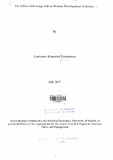| dc.description.abstract | Countries in sub-Saharan Africa depend heavily on foreign aid to finance their development efforts. In this paper an account of the effect of foreign aid on human development in Kenya is provided Several analytical frameworks are applied including descriptive statistics and performance modeling using ordinary least square method In this paper I discuss the result of research into the effect of foreign aid on human development, rather than focusing on growth and investment as is common in the existing literatures. I look at how aid impacts on a range of key human development indicators, including measures of health, education and longevity of life. Overall, aid is found to have a substantial positive impact on most development outcomes in Kenya. It is concluded therefore that, a policy of selectivity be adopted for more impact to be realized on human development in Kenya, this is in line with the world bank recent policy on aid disbursement to developing countries The paper is composed of Five chapters as follows. Chapter 1 is the introduction, which includes the background, statement of the problem, objectives and significance of the study. Chapter 2 is the review of the relevant literature, it includes theoretical, empirical and an overview of that literature. Chapter 3 provides the methodology which includes model specification, hypothesis and data-source and type. Chapter 4 provides empirical analysis, results and limitations, while chapter 5 gives the conclusions and policy recommendations | en |

